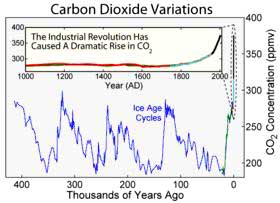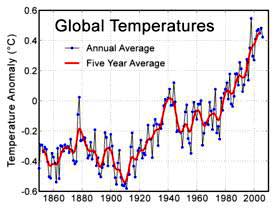|
|
| Help | |
| You are here: Rediff Home » India » News » Special |
|
| |||||||||||||||||||||||
|
| |||||||||||||||||||||||
Why are the world's richest nations, who are meeting in Germany [Images] beginning today, suddenly so concerned about the climate?
Why is global warming the buzzword all over?
Let's try and simplify one of the most critical issues the world is faced with today, with an FAQ (Frequently Asked Questions).
What are the major expectations of civil society all over the world from the G-8 summit in Germany?
The basic expectation is that the G-8 countries will behave like any normal adult person: Take responsibility for one's actions, face the consequences and act accordingly. It is no longer a matter of theory that development over the last 150 years is having a serious impact on the climate and the future impact is going to be serious.
Over 70 percent of current contribution to global warming is from the G-8 + 5 that will meet in Germany this week. The historical contribution of the G-8 is even larger. Evidence from the first four years of the new millennium shows that the emission of global warming gases, GWG, is increasing at a rate faster than the worst scenario built by the Intergovernmental Panel on Climate Change.
'Climate change reports not diluted'
So the expectation is that the G-8 countries will face these facts and take immediate action to reverse the trend. If the US does not fall in line, than the soft line that many advocates are suggesting is not an option. If the rest of the world is strong in resolve and action, renegades like the US and Australia will have no option but to fall in line.
The action should be to achieve the targets of the Kyoto Protocol and to set the stage of even higher reductions post-2012.
Over 208,557 people have signed the petition (see http://www.avaaz.org/en/climate_g8/ that reads:
'Climate change is the greatest threat facing our world today -- and we are almost out of time to stop it. You must tackle this problem now, decisively and together. Start working toward a new global agreement this year. Set binding global targets for emissions to avert catastrophic climate change. Take bold action immediately -- and we will join our efforts with yours.'
'The science is absolutely first rate'
What should India expect from it?
Some of the worst potential polluters of the future (and substantial contributors currently) like China and India have a legitimate case that the developed countries need to contribute substantial financial and technological resources for these countries to ensure that they achieve Millennium Development Goals and yet reduce GWG emissions.
It needs to be understood by everyone that the dichotomy that development is not possible without increasing GWG emissions is utterly false and is unacceptable.
What can India contribute in handling the issues of global warming and climate change?
India can contribute a vision that it is possible to achieve poverty reduction, sustainable and equitable development without leading to a substantial increase in GWG emissions. This is both an opportunity and a challenge for India and the world. And there are many options available to achieve that.
Organic farming, demand side management, reduction in losses, technologies like system of rice intensification, increasing production and end use efficiencies, truly renewable energy options like the wind, solar, small hydro, biomass, assessment and realisation of potential of use of methane from reservoirs, rainwater harvesting and ground water recharging are only some such possibilities.
'We are likely to see growing water scarcity'
Give us some idea -- actual examples -- how the world has become aware of these environmental issues and how and why it has become a hot issue at G-8.


Chart: Global mean surface temperature from 1850 to 2006
In 1896, Svante Arrhenius, a lonely Swedish scientist, discovered global warming -- as a theoretical concept, which most other experts declared implausible. In the 1950s, a few scientists in California discovered global warming -- as a possibility, a risk that might perhaps come to pass in a remote future.
In 2001 a panel representing virtually all the world's governments and climate scientists announced that they had reached a consensus: the world was warming at a rate without precedent during at least the last ten millennia, and that warming was caused by the buildup of greenhouse gases from human activity.
The atmospheric concentrations of CO2 and CH4 have increased by 31% and 149% respectively above pre-industrial levels since 1750. These levels are considerably higher than at any time during the last 650,000 years, the period for which reliable data has been extracted from ice cores.
Since 1979, land temperatures have increased about twice as fast as ocean temperatures (0.25�C per decade against 0.13�C per decade).
Global average air temperature near the Earth's surface rose 0.74 � 0.18�C (1.3 � 0.32�F) during the past century. Climate models referenced by the IPCC project says that global surface temperatures are likely to increase by 1.1 to 6.4�C (2.0 to 11.5�F) between 1990 and 2100.
This is, in spite, of the fact that natural phenomena such as solar variation combined with volcanoes have probably had a small warming effect from pre-industrial times to 1950, but a small cooling effect since 1950.
Latest emission data shows that the emissions today are worse than the worst scenario mentioned above. Although most studies focus on the period up to 2100, warming and sea-level rise are expected to continue for more than a millennium even if greenhouse gas levels are stabilised.
How has the world become aware? Well, it has been a tough journey, trying to convince the world that indeed human actions are leading to warming of the planet. In the beginning it was only the scientists who were struggling to convince the rest of the scientific community, but since early 1990s, civil society organisations have been putting pressure on the governments to recognise the issue and do something about it, which ultimately lead to the 2001 report by scientists around the world to report about it.
Five things Indians at an individual level must do to strengthen the movement to protect world environment:
1. Understand the global politics of climate change, and pressurise the Indian government to use the considerable clout that it has acquired in recent years, to make renegades like the US and Australia fall in line, and accordingly, demand that the developed world take responsibility for its role and make them contribute the resources for the developing world.
2. Pressurise the government to ensure that the resources for addressing issues connected with global warming are actually used for that purpose. That is not happening today. For example, a lot of bogus projects are getting funding in the name of carbon emission reduction.
3. Understand the science of climate change and ensure that the Indian government assesses India's contribution to global warming so that India can demand the same from the rest of the world. Not doing so would be risking our future.
4. Understand the considerable options available with us to reduce our contributions to global warming and act on those, so that the government is able to do the same. This will also set global examples and help all of us collectively achieve targets.
5. Ensure that the Indian government understands the sociology of climate change within India. The richest people and people living in urban areas are the greatest contributors and yet they have the resources to absorb the impact. The poor and people from rural areas contribute less to global warming and are least likely to have the resources to absorb the impact. Pressurise the government to adopt policies and programmes to address this reality.
How should India negotiate its stand and its resources when the rich and mighty nations debate the environment at G-8? At the negotiating table, what should we adhere to? What should we oppose or support in the national interest?
I think it would be in the interest of India and the world to take a hard line that we must work together to reduce the emission of CO2 to levels in 1990s and even lower by 2030 and set up shorter term goals. The country's targets would depend on the historic and per capita global emissions. Those who refuse to accept that, well, tough action can and should be taken to ensure that they fall in line.
Answers: Himanshu Thakkar, the South Asia Network on Dams, Rivers & People. www.sandrp.in
Rediff Specials
|
|
| © 2007 Rediff.com India Limited. All Rights Reserved. Disclaimer | Feedback |